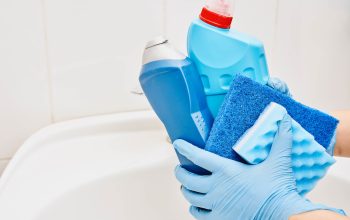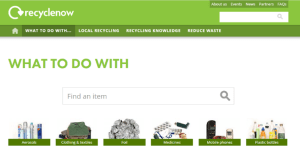Spring Clean
April 3, 2024

It’s that time of year, with Spring on the way, that we get the urge to have a clear out, whether it’s in the house, shed or garage. Why do we do it? It’s an opportunity to make space for something new, perhaps both physically and psychologically and the change of season makes it a particularly good time.
However, when you are clearing things out, consider whether the items are still in good condition; could they be useful to someone else? Could they be repaired, repurposed, donated, recycled or even sold? There are other options that don’t mean throwing items away but if you do have to, please recycle them or dispose of them correctly.
Reuse
Instead of throwing away an item that you no longer need, have you considered giving it a new lease of life? Sometimes known as up-cycling it’s a great way to save money or to get creative and give the item a unique twist.
There are several ways to reuse items ranging from repurposing furniture, creating garden ornaments from old household bits and bobs or repairing or upcycling your old clothes.
And if you really don’t want an item, you could give it a new home. There are multiple platforms out there for doing this, including giving it away or selling it via Freecycle, Gumtree or Facebook Marketplace etc. Or you could take it to a charity shop; just be sure to check they are accepting what you wish to donate.
For other reuse tips and suggestions, have a look at https://www.lesswaste.org.uk/reuse/
Repair
Perhaps you have an item in need of repair? There’s a huge satisfaction to be gained from making your own repairs. If you need help with fixing check out the sites below to see what support they can offer:
General fixing- https://www.facebook.com/leicestershirefixers/
Bike fixing- https://www.cyclinguk.org/essential-cycle-maintenance-advice
Recycling at home
If there are things that can’t be repaired, rehomed, or reused, please try to recycle as many as you can. Putting the correct items in the recycling helps reduce contamination and can make a big impact on the amount we recycle in Leicestershire, having a positive impact on the environment.
We know it can be confusing and so please follow our tips to help you get the most of your recycling:
- Ensure items are clean and dry – empty food and drink containers, give them a rinse and then leave to drain before recycling.
- Put lids back on jars and bottles before recycling – this makes sure the lids get captured.
- Remember to recycle items from all around the house, including cleaning product bottles and toilet roll tubes from the bathroom which often get forgotten.
Clean recycling is key to improving the quality and quantity of material we recycle, so let’s make every item count.
Textiles
Your home recycling bin isn’t the place for clothes and other textiles either. Whilst they can be reused, they’re not accepted as part of your kerbside recycling. There are two reasons for this. Firstly, they can become wrapped around the sorting facility equipment, causing extensive and costly damage. Secondly, during mixed recycling collections, textiles come into contact with all sorts of contamination, including unidentifiable liquids and broken glass, which is impossible to remove.
We recommend selling them, donating them or taking to a recycling bank or your nearest Recycling and Household Waste site. Your local council may also offer a separate clothing collection so make sure to check with them.
Batteries and small WEEE (waste electrical and electronic equipment)
Batteries and small electrical items are not accepted in your main recycling bin but some councils (North West Leicestershire; Melton and Blaby) do provide a separate collection from your home. Check out https://www.lesswaste.org.uk/2024/01/16/how-to-recycle-batteries/ for more information.
As a county resident it is your responsibility to make sure that the right things are going in the right bins. If in doubt, check our list of items that are accepted as part of your kerbside recycling, you can view it here.
Food waste
One of the main contaminants that comes through Leicestershire’s recycling stream is packaging that still contains food and drink residue. This includes items like dirty margarine tubs, half-eaten pots of yogurt and liquid left in drinks bottles. Once these items are in your recycling bin, the damage is done. They then run the risk of soiling other materials, like paper and card which cannot be cleaned.
Nappies
These belong in your rubbish bin and not your recycling bin, for more information check out https://www.lesswaste.org.uk/reuse/reusable-nappies/
Still not sure if an item can be recycled?
If you are a Leicestershire resident then a full list of what to do with unwanted items is available here. Or you could take a look at Recycle Now’s A-Z of What to-do-with guide.

Recycling and Household Waste Sites

Not all items can be recycled or thrown away at home, some may need to be taken to your local Recycling and Household Waste Site (RHWS) if other options are not available.
The sites can accept a range of items, although it can vary slightly from site to site and so do check what your local site accepts before you travel there. Further information can be found here: https://www.leicestershire.gov.uk/environment-and-planning/waste-and-recycling/find-a-recycling-and-household-waste-site
Bulky collections
If you have large items that you can’t transport, you can arrange a bulky collection for some larger items through your district council. Councils will collect a wide range of items, including household and garden furniture; bicycles; mattresses; large kitchen appliances, and garden waste. They will also collect smaller items if bagged appropriately. Collections differ slightly and there is sometimes a charge. Use the links below to check your local service:
- Blaby District Council
- Charnwood Borough Council
- Harborough District Council
- Hinckley & Bosworth Borough Council
- Melton Borough Council
- North West Leicestershire District Council
- Oadby & Wigston Borough Council
Home Composting
The arrival of spring may mean you’re venturing out into the garden for the first time and the perfect time of year to consider home composting. Home composting is a planet-friendly way of turning your waste garden materials and fruit and veg peelings into a useful product that will improve the nutrition and structure of your soil to benefit the plants you grow.
If you’re already a keen home composter, then you’ll know that spring is a good time to sort the compost bin and make use of the compost you’ve made.
Further information on home composting can be found on our website: www.lesswaste.org.uk/compost/home-composting/










